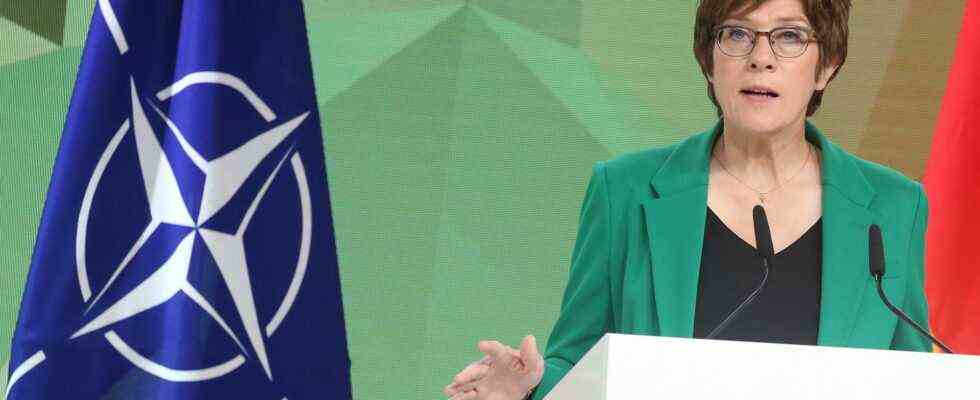Status: 06.10.2021 6:54 p.m.
The Ministry of Defense has started to process the Afghanistan mission. But the opening event shows that it is still difficult for politicians and generals to name mistakes publicly.
The process of coming to terms with 20 years of service in Afghanistan begins in a Berlin star hotel – and Annegret Kramp-Karrenbauer (CDU) is setting high expectations: “Only an honest, open and therefore painful debate will bring us further,” says the minister at her opening statement. One owes that to the soldiers who served in Afghanistan – and to those who will in future stand up “for German interests and values” internationally.
Bundeswehr promises to look for errors
But at the start of the process of coming to terms with Afghanistan, the Bundeswehr generals are not yet too self-critical. Despite the Taliban’s rapid takeover of power, Inspector General Eberhard Zorn does not want to draw any conclusions for future military crisis management in conflict regions and fundamentally question them.
The commander who headed the Bundeswehr evacuation mission at Kabul Airport, Brigadier General Jens Arlt, confesses in an interview with the ARD capital studio definitely a: “We have to look again to see that the result is not what we wanted it to be.” Overall, however, according to Arlt, the mission has by no means failed.
Stephan Stuchlik, ARD Berlin, at the beginning of the processing of the German mission in Afghanistan
Tagesschau 12:00 p.m., 6.10.2021 12:34 p.m.
Politicians and generals still find it difficult to publicly name real mistakes in Afghanistan. There would be many questions: Why was the Bundeswehr unable to prevent the Taliban from infiltrating Kunduz in 2006? Was it a mistake to team up with local rulers with dubious reputations? Why was the sympathies of the initially euphoric civilian population being gambled away?
Sönke Neitzel, Professor of Military History at the University of Potsdam, is one of the people who asks unpleasant questions on a podium – framed by four uniformed generals: “It is always the case that the Bundeswehr bash politics and politics bash the Bundeswehr. Nobody who was there will now say: I screwed up there. “
“Layer of clay between the inspector general and defense ministers”
One point that comes up again and again in this context is the inadequate communication between the military and political leadership. The accusation: Critical reports about the situation in Afghanistan did reach the Defense Ministry, but they rarely played a role in the political communication of the German government. Neitzel speaks of a “layer of clay between the Inspector General and the respective defense ministers”.
In addition, it is completely unclear, according to Neitzel, how the foreign and development aid ministries saw the Bundeswehr mission and how diplomats in Kabul assessed the situation. Corresponding reports are under lock and key at the Foreign Office.
“Networked Approach”
However, as proud as the federal government has always been of its “networked approach” in 20 years of Afghanistan (the cooperation between the departments) – each ministry seems to be on its own track when it comes to coming to terms with it. The invited Foreign Minister Heiko Maas (SPD) and the key defense politicians from the Greens, FDP, SPD and Union from the German Bundestag canceled the discussion initiated by the Defense Minister at short notice. Reason: The date while the government is being formed is “completely inappropriate”.
FDP politician Marie-Agnes Strack-Zimmermann affirmed in an interview with the ARD capital studio: “It shows once more – the minister loves going it alone.”
The start of the Afghanistan balance sheet was originally planned for the end of August, but it was postponed because of the military evacuation mission in Kabul. Beyond party-political skirmishes, the debate about the Bundeswehr’s missions abroad is likely to pick up speed in the future. Because after the Afghanistan experience, the controversial Federal Armed Forces mission in Mali is increasingly under very special observation.


